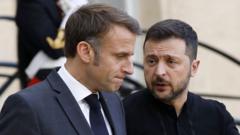The ongoing Gaza cease-fire faces uncertainty as Israeli Prime Minister Netanyahu demands the release of hostages from Hamas by a set deadline, with Trump backing a hardline stance on the situation.
Rising Tensions: Israel Threatens Gaza Cease-Fire Amid Hostage Situation

Rising Tensions: Israel Threatens Gaza Cease-Fire Amid Hostage Situation
Israel's Prime Minister Benjamin Netanyahu warns of renewed conflict unless Hamas releases hostages, echoing U.S. President Trump's remarks.
In a pivotal moment for the Gaza cease-fire, Israeli Prime Minister Benjamin Netanyahu has issued a stern warning regarding the potential resumption of "intense fighting" unless Hamas releases hostages by noon on Saturday. This ultimatum has coincided with troubling developments, as President Trump expressed his support for a hardline approach to Hamas, particularly following the group's announcement to postpone the release of hostages.
While Netanyahu refrained from disclosing the specific number of hostages necessary to avert a renewed conflict, it is noted that three individuals were due for release this week. Trump's discussions with Jordan's King Abdullah II have further complicated matters, with Trump insisting on the need for the U.S. to "take" Gaza. His suggestion that neighboring Jordan and Egypt should absorb the Palestinians has been met with resistance, as both nations have publicly rejected this proposal. Instead, Abdullah implied that the best course of action would involve comprehensive consultations with other Arab states.
In a bid to strengthen his position, Trump recently suggested that he might consider cutting the more than $1.5 billion in U.S. aid to Jordan unless the country agrees to accommodate Palestinian refugees. Such a move would be significant given the historical dependence of Jordan on U.S. financial support, which many analysts believe is crucial for the survival of Abdullah's monarchy amid increased regional instability.
Moreover, the Palestinian Authority is making headlines with its decision to cease payments to families of Palestinians imprisoned or killed by Israel, a controversial move aimed at securing Trump’s favor and improving the financial situation of the Palestinian leadership, which has faced severe economic pressures.
As international dialogue continues in this fraught atmosphere, the ramifications of these ultimatums and the impacts on the region remain to be seen, with ongoing scrutiny of both Israeli actions and U.S. foreign policy influencing the dynamics of the crisis.





















